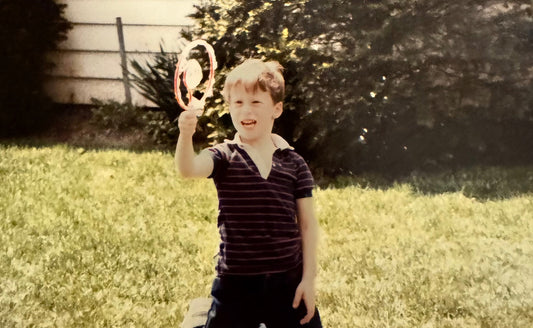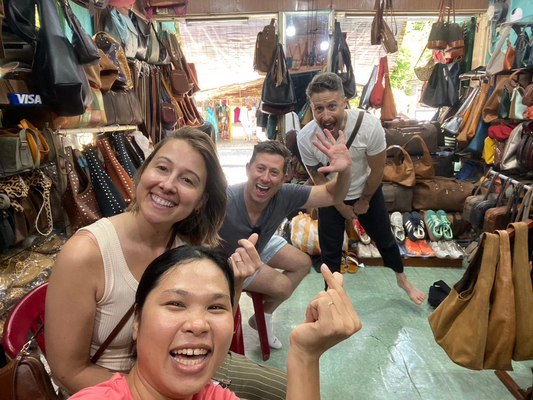
Measure Twice, Quit Often: Counting the careers (and stinky tofu) we never want to touch again
Appendix Out, Existential Crisis In
I’ve had four careers. Three and a half, if we’re being technical. And for all intents and purposes, I was good at them. I was profitable, sometimes praised, and even occasionally envied.
Then I left.
Not because I burned out or because I got fired. And certainly not because I had some kind of spiritual awakening in the produce aisle. I just… wasn’t interested anymore.
Which, depending on who you ask, either makes me wildly privileged or woefully flaky. And maybe I am a little of both. But here’s what I can’t fit on my LinkedIn headline: I think one of the most underrated markers of a life well lived is how many things you’ve figured out aren’t for you.
We romanticize the idea of sticking with something. We push grit…hard…and “seeing it through.” Especially when it comes to work. There’s this notion that success is measured in linearity. That the person who picked a lane at 22 and stayed in it until retirement is more noble or more valuable than the one who tried, assessed, and moved on.
But have you ever been to a Vietnamese market?
Your brain doesn’t fall in love with the first thing it sees. It scans, eliminates, and avoids. Neuroscience tells us we’re wired more for sifting out what we don’t want than zeroing in on what we do.
And that’s just when choosing a mango.
You do this instinctively at the grocery store. You reach for the riper avocado and put the milk back if the date’s off. You don’t call it indecisiveness. You call it discernment.
The same can be said for my walk through a market in Taiwan last month. My brain didn’t lead me toward what I wanted. It led me away from the stinky tofu. Immediately. No hesitation.
Why is it, then, that we apply less tolerance for exploration when it comes to our careers? Why is quitting something that no longer fits seen as a failure of discipline, rather than a flex of discernment?
It took an unexpected hospital visit last weekend to remove an appendix to remind me we are not obligated to be loyal to paths that no longer align. Especially when staying put doesn’t serve anyone. Not our families, our teams, or ourselves.
So maybe the goal isn’t to get it right the first time but to keep moving until the next thing feels like home. Even if that feeling only lasts a few seasons.
Chaptered, Not Restrained
I’ve worn a lot of different badges. Consultant. Interventionist. Coach. Founder 1.0. Founder 2.0. Now, maybe Founder 3.0? Each of these came with a learning curve. A rhythm and a sense of purpose. And then, quietly, a restlessness. Not because I was failing but because I was done.
Some people call that wandering. I call it metabolizing. It’s taking in everything I could, until it no longer nourished me. And then moving on, not in a blaze of drama, but with a calm clarity that said: This served me. And now it doesn’t.
That’s a kind of intelligence we don’t celebrate enough: the ability to choose discomfort over stagnation. The guts to walk away not when things get hard, but when they get hollow. But that’s not the story in our feeds.
There’s a kind of success story that dominates our culture: the founder who grinds for twenty years to make the dream real. The executive who climbs from intern to C-suite without blinking. The artist who knew what they wanted at age five and never strayed.
We love that story because it makes us feel like there’s a formula. Like certainty is a virtue, not a coping mechanism. But there’s another version. The one that doesn’t get told on conference stages. Where someone says, “This chapter was good. And it’s over.”
That’s not giving up. That’s graduating.
Sifting Is a Skill
I’ll say it again: we’re wired for sifting. Our minds are built to filter out what doesn’t fit long before they zero in on what does. And yet, when it comes to our careers or our identities we pretend it should be the opposite. We flinch at the idea of filtering our careers and we “stick it out.”
But why?
If the thing you’re in no longer fuels your curiosity, if it drains more than it fills, if it no longer makes you proud to put your name on it, what exactly are you sticking around for? The exit? The pension? The sense of security? Well yeah. These are all valid reasons.
They just aren’t mine. And that’s the point here.
When I was in the hospital last week, high on painkillers and grilled tofu broth, I had a moment. The kind that only really comes when your body forces you to stop doing and just be. And what I remembered was this: every time I’ve walked away from something that no longer fit, something better eventually found me. Or I found it, because I was finally free to look again.
And I’d be remiss not to mention the rise of AI and how it hasn’t changed my instinct to move. If anything, it’s confirmed it. Standing still used to feel noble. Now it feels like bait. We’re in an era where the apex predator isn’t a competitor. It’s an algorithm.
The best strategy might not be to specialize harder, but to stay fluid. To keep pivoting and discovering what’s worth doing…because you’re still the one doing it.
Not because some system hasn’t automated it yet.
Final Words: Measure What Matters
We don’t have to measure our lives in milestones or mastery. We can measure them in thresholds. In the things we outgrew and the roles we shed. Even in the people who said, “I see you,” and the ones who waved goodbye as we walked toward something new.
I don’t want to be remembered for sticking it out. I want to be remembered for knowing when to pivot, for chasing stimulation and for refusing to pretend.
But none of this works without alignment at home. I haven’t built this start-stop-shift kind of career despite Rachel. I’ve built it with her. These pivots aren't my decisions. They’re ours. The way I navigate my work has to support her dreams, too. That’s not compromise. That’s commitment.
It’s how you build a life together, not just a life adjacent.
So here’s to the “nope” list. The projects we passed on, the partnerships we ended and the dream careers we outgrew. Because knowing what we don’t want? That transcends clarity. That’s confidence.
And I don’t know about you but I’d rather collect a lifetime of clean exits than one long, overstayed stay.
A coach’s note
I take being a coach seriously. Hell, I take everything seriously. And my most scathing critique of the industry is how often coaches project their own choices onto others. It’s one of the hardest traps to avoid.
I’m not here to tell you how to define success. This is just my version. Not the version. The real goal? To remind you of your capacity to decide for yourself. Especially when your version bumps up against what the world says is “right.”
Because when everything feels out of control, having your own metric for meaning is the only kind of power that lasts. That’s all I’m really doing here. Writing to help you take that back.
So If anything I said hit (or missed) send me a message and ask me anything. Coaching, career pivots, stinky tofu. All fair game.




